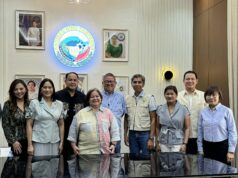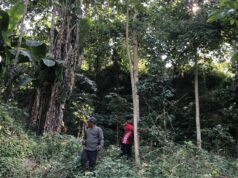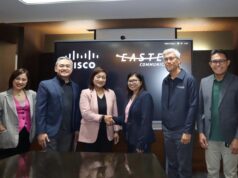HE PLACED 8th in the 2008 medical board exam and got his baptism of fire – literally – eight days into his assignment in Saranggani province when armed conflict broke out between the military and the Moro Islamic Liberation Front.
Dr. Lemuel Non rose to the challenge posed by the health needs of over 800 indigent patients, mostly of the T’boli tribe in three evacuation centers by streamlining health care delivery, mobilizing men and women in sanitation and malaria prevention – all these at the risk of being kidnapped or ending as a casualty to the conflict.
“Nothing in the medical schools prepared me for this. It was so heartwarming though to see that my mere presence calmed them down,” Non recalls.
As San Isidro town in Isabela – population 22,000 – saw its first medical practitioner in four years, Dr. Paulo Papillero was swamped with all sorts of ailments and health problems. Averaging 50 patients a day including house calls, Papillero was ever “drop-dead tired” to bed. But he would not trade his work here for any world-class hospital in Manila.
“Manila is so commercialized. Here people are more up close and personal. When you go to them and help them, they don’t have anything to give you, sometimes chickens, vegetables, fruits. But their smiles are worth more than I would have earned were I in Manila. I’ll definitely extend my stay here,” Papillero avers.
“My territory covers 61 barangays . To reach all of them, I have to cross 24 rivers. It takes up to seven hours brisk walking uphill to get to some areas,” says Dr. Niko Majarocon of her assignment in Boac, Marinduque.
Aside from taking in up to 50 patients a day, Majarocon routine comprises of local health board meetings, barangay visits, medical and dental missions, the training of health workers, and the conduct of seminars on nutrition and sanitation.
Still to Majarocon: “It’s very fulfilling working here, though not easy. I know God is taking care of me.”
God took good care too of the cancer-stricken mother of Dr. Romelei Camiling, UP graduate and native of the City of San Fernando.
Camiling was about to leave for Agutaya, Palawan when her mother was diagnosed with the disease. After entrusting her to the care of her sister and her benefactor, Camiling proceeded to her assignment of six islands, where, in December 2008, she was stranded due to a typhoon that brought 30-foot waves.
“My mom was miraculously healed,” Camiling says, firm in the belief that her fulfilling her commitment to heal the indigent patients was a reward from heaven.
Material rewards came to Camiling too from the grateful people of Agutaya who presented her with a beach wedding, all expenses paid including the wedding gown last March.
In San Quentin, Abra, Dr. Winnie Umali had “only” six barangays with 6,000 people to serve.
But this did not prove easy. Spending a lot of hours going from one place to the next, many times needing to ride motorboats. Not to mention the initial “aversion” of the local government staff to her presence.
“I did not confront them but initiated team building activities even as we went on medical and dental missions. This paved the way for me to understand them and for them to understand me. Now our bonding is like family,” Umali said.
“Being a barrio doctor entails a lot of sacrifice – patience,humility, self-discipline, self-control. But being with people here made me appreciate the simplicity of life and thankful that I am able to share with them quality medical care.”
Umali may have spoken for Non, Papillero, Marojocon, Camiling and 15 other Batch 1 scholars of the Bagong Doktor Para sa Bayan (BDB) program serving remote areas since November 2008; as well as for the other scholars slated to serve after their graduation from the University of the Philippines and the Pamantasan ng Lungsod ng Maynila
In 2006, the First Gentleman Foundation Inc. (FGFI) received letters from poor but deserving medical students faced with financial difficulties in completing their studies.
The letters could have been divinely guided as First Gentleman Jose Miguel Arroyo had always wanted to be a doctor, only taking law in obedience to his father.
“I did not think twice, I knew what to do,” Arroyo said, adding that the birthing of the BDB was inspired by the barrio doctors program of then Health Secretary Juan Flavier.
On Arroyo’s turn at senior citizenship in 2006, the first batch of BDB scholars was presented – 10 from UP and PLM.
“It was one of my happiest birthdays. I knew my dream of being a doctor was being fulfilled – by these young men and women who are committed to dedicating at least two years of their lives to helping others, especially those in underserved areas,” Arroyo remembers.
BDB scholars are given free tuition and other fees, including allowances, and medical equipment by the FGFI.
Aside from the scholarship, the First Gentleman has given P500,000 twice annually as incentives for barrio doctors since 2006, and P100,000 cash prize to the best doctor of each batch.
Four batches totaling 100 scholars have so far gone through or are currently undergoing the BDB program.
At a recent Malacanang luncheon where Batch 4’s 38 scholars were introduced, Arroyo announced that the FGFI will provide funding for 50 more scholars in 2010, bringing the total to 150.
“I find great hope in these scholars who will be the catalyst to change the mindset of doctors leaving the country and inspire them to reach out instead to poor Filipinos in remotest locations and have no access at all to healthcare services,” Arroyo said of the achievements of the Batch 1 scholars in their areas of assignment.
To all expressions of gratitude to him, the Arroyo says: “Don’t thank me. Instead of going abroad, stay in the barrios. Our poor Filipinos need you.”
Seeing the realization of his childhood dreams in the barrio doctors is enough fulfillment for the First Gentleman.
“You know, when they introduce me, they say: ‘Dr. Paolo Papillera, ang doctor na pinadala ni FG sa atin.’ Unlike in Manila, in this remote community, the good work of FG is recognized.”
And would not be easily forgotten his legacy of service to the poorest Filipinos in the remotest corners of the country.
Dr. Lemuel Non rose to the challenge posed by the health needs of over 800 indigent patients, mostly of the T’boli tribe in three evacuation centers by streamlining health care delivery, mobilizing men and women in sanitation and malaria prevention – all these at the risk of being kidnapped or ending as a casualty to the conflict.
“Nothing in the medical schools prepared me for this. It was so heartwarming though to see that my mere presence calmed them down,” Non recalls.
As San Isidro town in Isabela – population 22,000 – saw its first medical practitioner in four years, Dr. Paulo Papillero was swamped with all sorts of ailments and health problems. Averaging 50 patients a day including house calls, Papillero was ever “drop-dead tired” to bed. But he would not trade his work here for any world-class hospital in Manila.
“Manila is so commercialized. Here people are more up close and personal. When you go to them and help them, they don’t have anything to give you, sometimes chickens, vegetables, fruits. But their smiles are worth more than I would have earned were I in Manila. I’ll definitely extend my stay here,” Papillero avers.
“My territory covers 61 barangays . To reach all of them, I have to cross 24 rivers. It takes up to seven hours brisk walking uphill to get to some areas,” says Dr. Niko Majarocon of her assignment in Boac, Marinduque.
Aside from taking in up to 50 patients a day, Majarocon routine comprises of local health board meetings, barangay visits, medical and dental missions, the training of health workers, and the conduct of seminars on nutrition and sanitation.
Still to Majarocon: “It’s very fulfilling working here, though not easy. I know God is taking care of me.”
God took good care too of the cancer-stricken mother of Dr. Romelei Camiling, UP graduate and native of the City of San Fernando.
Camiling was about to leave for Agutaya, Palawan when her mother was diagnosed with the disease. After entrusting her to the care of her sister and her benefactor, Camiling proceeded to her assignment of six islands, where, in December 2008, she was stranded due to a typhoon that brought 30-foot waves.
“My mom was miraculously healed,” Camiling says, firm in the belief that her fulfilling her commitment to heal the indigent patients was a reward from heaven.
Material rewards came to Camiling too from the grateful people of Agutaya who presented her with a beach wedding, all expenses paid including the wedding gown last March.
In San Quentin, Abra, Dr. Winnie Umali had “only” six barangays with 6,000 people to serve.
But this did not prove easy. Spending a lot of hours going from one place to the next, many times needing to ride motorboats. Not to mention the initial “aversion” of the local government staff to her presence.
“I did not confront them but initiated team building activities even as we went on medical and dental missions. This paved the way for me to understand them and for them to understand me. Now our bonding is like family,” Umali said.
“Being a barrio doctor entails a lot of sacrifice – patience,humility, self-discipline, self-control. But being with people here made me appreciate the simplicity of life and thankful that I am able to share with them quality medical care.”
Umali may have spoken for Non, Papillero, Marojocon, Camiling and 15 other Batch 1 scholars of the Bagong Doktor Para sa Bayan (BDB) program serving remote areas since November 2008; as well as for the other scholars slated to serve after their graduation from the University of the Philippines and the Pamantasan ng Lungsod ng Maynila
In 2006, the First Gentleman Foundation Inc. (FGFI) received letters from poor but deserving medical students faced with financial difficulties in completing their studies.
The letters could have been divinely guided as First Gentleman Jose Miguel Arroyo had always wanted to be a doctor, only taking law in obedience to his father.
“I did not think twice, I knew what to do,” Arroyo said, adding that the birthing of the BDB was inspired by the barrio doctors program of then Health Secretary Juan Flavier.
On Arroyo’s turn at senior citizenship in 2006, the first batch of BDB scholars was presented – 10 from UP and PLM.
“It was one of my happiest birthdays. I knew my dream of being a doctor was being fulfilled – by these young men and women who are committed to dedicating at least two years of their lives to helping others, especially those in underserved areas,” Arroyo remembers.
BDB scholars are given free tuition and other fees, including allowances, and medical equipment by the FGFI.
Aside from the scholarship, the First Gentleman has given P500,000 twice annually as incentives for barrio doctors since 2006, and P100,000 cash prize to the best doctor of each batch.
Four batches totaling 100 scholars have so far gone through or are currently undergoing the BDB program.
At a recent Malacanang luncheon where Batch 4’s 38 scholars were introduced, Arroyo announced that the FGFI will provide funding for 50 more scholars in 2010, bringing the total to 150.
“I find great hope in these scholars who will be the catalyst to change the mindset of doctors leaving the country and inspire them to reach out instead to poor Filipinos in remotest locations and have no access at all to healthcare services,” Arroyo said of the achievements of the Batch 1 scholars in their areas of assignment.
To all expressions of gratitude to him, the Arroyo says: “Don’t thank me. Instead of going abroad, stay in the barrios. Our poor Filipinos need you.”
Seeing the realization of his childhood dreams in the barrio doctors is enough fulfillment for the First Gentleman.
“You know, when they introduce me, they say: ‘Dr. Paolo Papillera, ang doctor na pinadala ni FG sa atin.’ Unlike in Manila, in this remote community, the good work of FG is recognized.”
And would not be easily forgotten his legacy of service to the poorest Filipinos in the remotest corners of the country.




